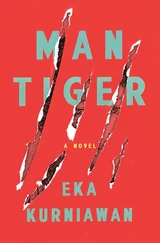They brought his remains, which looked more like broth or batter than a human corpse, home and buried him properly. Dewi Ayu named the hill Ma Gedik Hill, jutting up next to Ma Iyang Hill, and decided to mourn for a week. At the end of her mourning period she received word that Ted Stammler had fallen defending Batavia in the last battle before Holland’s surrender. His corpse never arrived, but Dewi Ayu decided to mourn again for another week. At the end of her second mourning period, delighted that she hadn’t received any more sorrowful news, she threw off all her mourning garments. She put on cheerful clothes, made herself up nicely, and went to the market as if nothing had happened. But upon her return home, she heard something way more surprising than news of another death.
Mr. Willie, wearing a jacket and tie and shiny leather shoes, approached her saying that he had some important business to discuss. Dewi Ayu thought the man was going to quit and go to Batavia to look for work, or maybe join the Japanese army. Neither of her guesses was even close. Mr. Willie’s face, red with embarrassment, did not give anything away until the moment he spoke. He only a uttered few words but they made her catch her breath:
“Miss,” he said. “Marry me.”

DEWI AYU HAD forgotten that there was no way the Japanese soldiers could be winning the war without any information, such as the fact that she was the child of a Dutch family. It wasn’t just her face and her skin that gave her away, but also the city’s public records, the entire archive of which the Japanese now controlled, and so they weren’t going to believe she was a native, whether or not her name was Dewi Ayu.
“I guess that’s how it is,” she said. “Just like everyone knows that guy Multatuli is a drunk and not really Javanese.”
She was all by herself, feeling nostalgic and listening to the gramophone spin her grandfather’s favorite songs, Schubert’s Unfinished Symphony and Rimsky-Korsakov’s Scheherazade , while thinking about how she should reply to Mr. Willie’s proposal. She knew Mr. Willie was a very good man — she had even once hoped he might marry her Aunt Hanneke. Disappointing a good man like that was just as hard as recklessly marrying him, but whatever the circumstances, after her tumultuous marriage to Ma Gedik she would never even consider marrying anybody else.
Mr. Willie had come to Halimunda when her grandfather ordered their Colibri from the Velodrome store in Batavia to replace their ancient Fiat. The company belonged to a businessman named Brest van Kempen, a kind man who let people buy cars on installment plans. Her grandfather didn’t need an installment plan, but his friends had told him about the great promotion that the Velodrome was offering — the car came complete with free accident insurance, access to a great repair shop, and they were throwing in a driver who was experienced in handling engines. He returned home with Mr. Willie, who became their driver and mechanic, especially useful because they needed someone to take care of the plantation equipment. He was of medium build, in his mid-thirties. His vest was always left unbuttoned, his clothes perpetually covered in grease, and he carried a pistol to shoot rats and pigs. That was back when Dewi Ayu was still just an eleven-year-old girl, five years before Mr. Willie proposed to her.
“Think about it, Mister,” she said. “I’m sort of a crazy woman.”
“When I look at you I don’t see any signs of insanity,” said Mr. Willie.
“When Ma Gedik died, I realized I had only married him because I was so angry that Ted had destroyed his love. So, clearly, I’m crazy.”
“You’re just a little irrational.”
“And that’s just another way of saying crazy, Mister.”
But now her salvation came: she could run away and avoid having to reply to his proposal. It was still morning and the record had not yet finished playing its last song when she saw military trucks lined up on the beach, ready to round up all the remaining Dutch inhabitants and take them to a prison camp. The day before, the soldiers had come to their houses and ordered them to pack. That night, without saying anything to anyone, especially not to Mr. Willie, Dewi Ayu had gathered her things. She didn’t take much, just one suitcase filled with clothes, a blanket, a thin sleeping pallet, and documents proving her family’s holdings. She didn’t take any money or jewelry, because she knew all that would just get stolen. Instead, she gathered up some necklaces and bracelets that had belonged to her grandmother and flushed the jewelry down the toilet into the waiting shelter of shit. She divvied up the remaining portion into a number of small envelopes to give to the household servants so that they could survive while looking for work someplace else. For herself, she swallowed six rings inset with jade, turquoise, and diamonds. They would be safe inside her, would come out along with her shit, and then she would swallow them again, for as long as she was imprisoned. But now it was time to go — one of the trucks had stopped outside her house and two soldiers had gotten out with bayonets in their hands and they were climbing the steps to the veranda where she was sitting waiting for them.
“I know you guys,” said Dewi Ayu, “you’re the photographers who used to work at the bend in the road!”
“Yeah, that was fun. We got photographs of every single Dutch person in Halimunda,” answered one of the soldiers.
The other one spoke: “Prepare yourself, Miss.”
“You mean Madam,” said Dewi Ayu. “I’m a widow now.”
She asked for a moment to say goodbye to the household servants. They seemed to know that their mistress would be leaving. She saw one of the cooks, Inah, crying. Inah truly owned the kitchen, and Dewi Ayu’s grandmother had entrusted all the meals for family guests to her. Dewi Ayu would never again enjoy her tasty rijsttafel , maybe not for the rest of eternity — a good cook was an important part of any family’s wealth, but now the family had disappeared and the last member was herself leaving, to become a prisoner of war. As she gave the woman a golden necklace, Dewi Ayu was flooded with memories. When she was little, Inah had taught her how to cook, had let her grind spices and fan the stove embers. She felt a shock of sadness more overpowering than when she had heard the news that her grandmother and grandfather had died.
Next to the cook stood a houseboy, Inah’s son. Muin was his name. He always dressed sharper than anyone else, with his blangkon hat, impressing even the Dutch. His duty was to make rounds throughout the house, but he was busiest at mealtimes when he had to set and mind the table. Ted Stammler had taught him how to use the gramophone, often ordering him to change the record or search for a particular song. He was always happy to do it, turning the record and moving the needle as if he was the only man for the job. He had learned many classical pieces, and seemed to really enjoy them too.
“You can have all of that,” Dewi Ayu said to him, pointing to the gramophone and the shelf of records.
“I couldn’t!” said Muin. “They belong to our Master.”
“Believe me, dead people don’t listen to music.”
Years later, after the war ended and the republic stood, she saw Muin again. At that time there were almost no Dutch families left, and no one was rich enough to have very many servants. She knew that Muin couldn’t do anything much except set the table and work the gramophone; and there he was in front of the market playing the records inherited from her grandfather, while a clever little trained monkey passed back and forth pushing a little wagon or carrying an umbrella, dancing in time to the Symphony No. 9 in D Minor , and people threw small change into the blangkon that Muin now set out upside down. Dewi Ayu only watched him from afar, smiling at his good fortune.
Читать дальше












